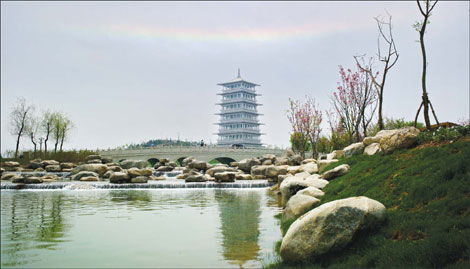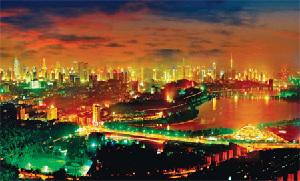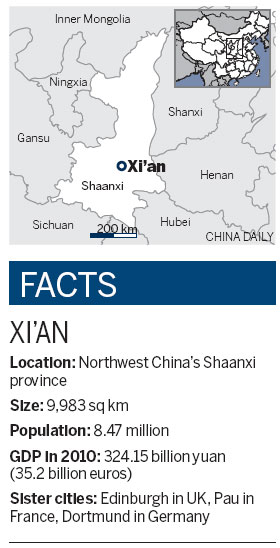Green makeover
Updated: 2011-07-01 13:36
By Liu Lu (China Daily European Weekly)
|
 The Chang'an Tower in 2011 International Horticultural Exposition park in the Chanba area of Xi'an, capital of Shaanxi province. Local authorities have invested 12 billion yuan to build Chanba into an eco-friendly area. Provided to China Daily
|
Cleanup of Xi'an wasteland pays off for ancient city
It is the weekend, but amateur photographer Xu Xiangnan is already up in the early hours of the morning. Clad in camouflage attire and carrying a set of professional camera equipment, Xu, 37, heads to the outskirts of Xi'an, capital of Northwest Shaanxi province.
Forty-minutes later, he arrives at the Chanba Ecological District. With the fresh cool breeze blowing from the surface of its glistening pools of water, the green zone offers an immediate from the scorching heat downtown. Shades of trees also provide a natural shelter for anglers to escape the dog days of summer.
Xu gets excited when he spots several waterfowl wading in the nearby wetland. He snaps away at his camera shutter.
"Who would have imagined that all this was a huge garbage dump, one of the most polluted areas of Xi'an, just six years ago?" Xu asks.
|
|
"No one would have wanted to come here then, but Chanba is now one of Xi'an's most popular locations for wedding photos. It is also a favorite sightseeing spot for shutterbugs."
For many people like Xu, Chanba offers one of the best examples of Xi'an authorities' efforts to apply ecological ideas to the ancient city, which is famous for top historical attractions like the terracotta warriors nearby.
The district has been built into a pioneering ecological zone to showcase Xi'an as a model for Chinese urban development.
"A city's level of development is not only measured by its economic prosperity, but also by how it builds its ecological environment," says Wang Jun, head of the publicity department of the CPC Xi'an committee.
"It is not just high-rise buildings that impress visitors most, but the city's natural environment," Wang says.
Xi'an is already gearing up to show the world a brand new Chanba. On April 28, the 2011 International Horticultural Exposition was launched in the zone, marking the largest international event hosted in Xi'an and Northwest China.
"It is a recognition and encouragement for Xi'an's determination to build Chanba into a model, environmentally friendly zone in Northwest China," says Wang, who is also the vice-director of the executive committee of the Xi'an International Horticultural Exposition.
Xi'an is located in the country's arid and semi-arid areas, but it has become the third Chinese city to host the international event after Kunming in Southwest Yunnan province and Shenyang in Northeast Liaoning province.
Covering a water area of 418 hectares, the Chanba area of Xi'an boasts one of the largest park and water areas for hosting the event.
"People used to consider Xi'an a dusty city that suffered severe water shortages, but they will soon realize it is a misconception after visiting the expo and Chanba," Wang says.
Wang says Chanba was one of the major ports connecting Xi'an and other important waterways in ancient times. It got its name from its unique position in the delta area of the Chanhe and Bahe rivers. But the two rivers were seriously polluted before 2005, becoming one of the biggest victims of Xi'an's soaring GDP.
"The city's rapid industrialization and urbanization, together with the rising population, placed mounting pressure on the eco-system," Wang says.
Due to the lack of an underground sewage water system, about 100,000 cubic meters of industrial effluent and sewage produced by 60 million people flowed into Chanhe River every day, accounting for 20 percent of the river's daily runoff, Wang says.
Bahe River was also turned into a huge sand-dredging site. As it contains top quality sand for building, profit-driven villagers exploited the resources, resulting in severe riverbed sinkage. Huge amounts of construction waste were also dumped along the river bank, amounting to nearly 500 million cubic meters. All these factors contributed to Chanba's deteriorating environment and made it an "untouchable place" for tourists.
To tackle the problem, Xia'an authorities invested 12 billion yuan (1.3 billion euros) from 2003 to restore Chanba's seriously damaged ecosystem. Environment researchers traveled to Paris and Rome, which are also ancient cities with thousands of years of history, to learn their sewage treatment.
As part of the cleanup, 25 drainage outlets along Chanhe River have been blocked and sewage has been channeled into newly built treatment plants. A number of polluting enterprises built along the river have been shut down or suspended.
Authorities also directed river water into sand-dredging pits, which have gradually formed into natural wetlands. Similarly, 533 hectares of trees and grassland have been planted along the river to help contain the water.
Apart from curbing river pollution, Chanba has bigger plans to improve the environment. With a total investment of 1.6 billion yuan, the district in 2009 started building a national wetland park, which is expected to be completed in five years.
The efforts are paying off.
On Oct 17, 2010, Chanba district successfully passed an evaluation by the Ministry of Environmental Protection to become the first State-level ecological zone in central and western China, marking its successful transition from an "ecologically disastrous area" into an "ecological compensation zone".
"The improved environment in Chanba has also greatly improved the overall air quality in Xi'an, effectively improving the living conditions for local residents," Wang says.
"We learnt a lesson - that it is short-sighted to blindly pursue economic interests at the expense of destroying the environment, in a city's urban development."
Wang says Xi'an had a poor environmental reputation in the past. But now, with the establishment of the Chanba Ecological District, the city is proud to show the world its glorious past and its refreshed green side.
"Without the remarkable achievements made by Chanba, Xi'an could not get the chance to host the 2011 World Horticultural Expo."
The expo has in return greatly enhanced prestige and spurred tourism in its host location, making the previously little-known Chanba a new tourist attraction. In April this year, Chanba was crowned "China's most influential international tourist destination" at the China Tourism Investment Symposium in Hong Kong.
Chanba's green revival has also attracted more people to move from the crowded downtown area to this livable place.
"A few years ago, no one wanted to buy apartments in Chanba, but today so many people, including people from neighboring cities, want to move here, even if the housing prices are much more expensive," says Du Hongtao, 53, a taxi driver.
Du says very few people took cabs to Chanba in the past, but now with the rise of the ecological zone as well as more people living and working here, taxis are more frequently seen in the district.
"Chanba will become a real low-density and eco-friendly residential area," says Tang Dongqing, chief executive of the Xi'an Zhenye Real Estate Development Co Ltd. Tang says a housing project in Chanba is the first investment made by the Zhenye Group, a listed company on the Shenzhen Stock Exchange, in Northwest China.
"Not everyone was optimistic about the investment in the first place, because they had a pre-conceived notion that Northwest China has a relatively poorer living environment than the east. They were very surprised to know about Chanba."
"With the strikingly improved environment in Chanba and the opening of the expo, we are more convinced of our decision."
Tang says Chanba wants to build a green neighborhood as all the residential buildings are required to be built with environmentally friendly materials. Solar and geothermal energy are also extensively used in common households.
The expo will help the area become a well-known eco-tourism resort and enable it to become a key financial business district in Xi'an and even Northwest China, says Chen Jing, deputy director of Chanba's economic development bureau.
Chen says the district has signed 26 investment contracts worth 48.5 billion yuan at the 12th East-West China Cooperation & Investment Trade Fair held in early April in Xi'an.
"We only introduce environmentally friendly enterprises and organizations with zero waste emissions into our district. Financial enterprises and research institutes are particularly welcomed."
Chen says that by 2020, at least 1,100 financial and business organizations will gather in Chanba to achieve a financially added value of 15 billion yuan, contributing to more than 50 percent of the new value-added sector in Xi'an's financial industry.
"We plan to use 10 to 15 years to build Chanba into a world-renowned international ecological business district."
"In the near future, after visiting the Terracotta Warriors near Xi'an, more tourists will also like to take a low-carbon tour of Chanba."
E-paper

Ringing success
Domestic firms make hay as shopping spree by middle class consumers keeps cash registers ringing in Nanjing
Mixed Results
Crowning achievement
Living happily ever after
Specials

Ciao, Yao
Yao Ming announced his retirement from basketball, staging an emotional end to a glorious career.

Going the distance
British fitness coach comes to terms with tragedy through life changes

Turning up the heat
Traditional Chinese medicine using moxa, or mugwort herb, is once again becoming fashionable

